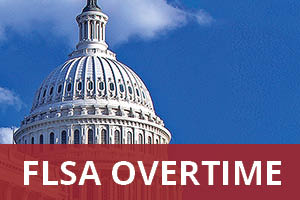Supreme Court: Highly Compensated Employee Entitled to Overtime Because Employer Did Not Pay on a Salary Basis
 On February 22, the U.S. Supreme Court issued its decision in Helix Energy Solutions, Inc. v. Hewitt, finding that an employee making over $200,000 per year was entitled to overtime pay under the Fair Labor Standards Act (FLSA) because he was not paid on a salary basis. The case is a reminder that exempt status depends not only on how much the employee is paid, but also on how they are paid. Employers may want to be particularly careful when providing exempt employees — including part-time exempt employees — with different weekly pay based on hours worked.
On February 22, the U.S. Supreme Court issued its decision in Helix Energy Solutions, Inc. v. Hewitt, finding that an employee making over $200,000 per year was entitled to overtime pay under the Fair Labor Standards Act (FLSA) because he was not paid on a salary basis. The case is a reminder that exempt status depends not only on how much the employee is paid, but also on how they are paid. Employers may want to be particularly careful when providing exempt employees — including part-time exempt employees — with different weekly pay based on hours worked.
Under U.S. Department of Labor (DOL) regulations, an employee must meet the following three requirements to be considered an executive, administrative or professional employee exempt from the FLSA’s overtime pay mandates: (1) perform duties consistent with those exempt categories as set forth by the DOL, (2) be paid a minimum salary (currently set at $684 per week), and (3) be paid on a salary basis. The employer in the case argued that the employee was exempt because he was paid $963 per day, therefore making at least the minimum salary of $684 per week, and he met the duties test for an executive.
The court found, however, that the employee was not paid on a salary basis as set forth in Section 541.602 of DOL regulations and was therefore not exempt. Section 541.602 requires exempt employees to receive the full pre-determined salary for any week in which they perform any work without regard to the number of days or hours worked. Specifically, the court said the employee “did not get a salary (of $963 or any other amount) because his weekly take-home pay could be as little as $963 or as much as $13,482, depending on how many days he worked.” The court did say, however, that daily-rate workers could qualify as paid on a salary basis if the pay met the conditions set out in DOL regulations §541.604(b).
In a dissenting opinion, Justice Brett Kavanaugh contended that the salary threshold and salary basis test — both of which DOL created through regulations — may not be consistent with the FLSA itself. Specifically, Kavanaugh said:
“The Act focuses on whether the employee performs executive duties, not how much an employee is paid or how an employee is paid. So it is questionable whether the Department’s regulations — which look not only at an employee’s duties but also at how much an employee is paid and how an employee is paid — will survive if and when the regulations are challenged as inconsistent with the Act. It is especially dubious for the regulations to focus on how an employee is paid (for example, by salary, wage, commission, or bonus) to determine whether the employee is a bona fide executive. An executive employee’s duties (and perhaps his total compensation) may be relevant to assessing whether the employee is a bona fide executive. But I am hard pressed to understand why it would matter for assessing executive status whether an employee is paid by salary, wage, commission, bonus, or some combination thereof.”
Since the employer in this case failed to raise the challenge to the regulations properly, the issue was not considered before the court. As such, it remains unclear how many justices agree with Kavanaugh and whether the majority of the court would overturn the DOL’s salary basis and threshold tests.
CUPA-HR continues to monitor all updates relating to the FLSA and its implementing regulations and will keep members apprised of significant news with respect to the overtime issue.


